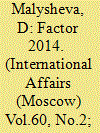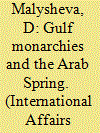| Srl | Item |
| 1 |
ID:
130840


|
|
|
|
|
| Publication |
2014.
|
| Summary/Abstract |
The article examines the impact of the withdrawal of most U.S. and International Security Assistance Force (ISAF) armed forces from Afghanistan in 2014 on foreign relations in Central Asia. The possibility that the withdrawl will lead to a return to power of the Taliban movement and impact of that outcome on internal security in Tajikistan, Uzbekistan and Turkmenistan are examined. Russia's foreign relations with Central Asia are discussed in relationship to possible instability in Afghanistan.
|
|
|
|
|
|
|
|
|
|
|
|
|
|
|
|
| 2 |
ID:
117396


|
|
|
|
|
| Publication |
2012.
|
| Summary/Abstract |
THE HIGH WAVE of social and political protest in the Middle East and North Africa raised by mainly domestic discontent gave all sorts of external forces a chance to channel anti-government riots in the desired direction. The Gulf monarchies or, to be more exact, the "Wahhabi tandem"1 of Saudi Arabia and Qatar moved, for the first time in their history, onto the world arena; they joined forces with the West and tapped to the full their financial, military, political and information resources to make the Persian Gulf a geopolitical center in its own right in the Middle East and the Arab world.
|
|
|
|
|
|
|
|
|
|
|
|
|
|
|
|
| 3 |
ID:
137296


|
|
|
|
|
| Summary/Abstract |
UNTIL RECENTLY, the African countries north of the equator and south of the Sahara and their problems remained, on the whole, at the periphery of not only Russian but also the world's information and political field.
|
|
|
|
|
|
|
|
|
|
|
|
|
|
|
|
| 4 |
ID:
189190


|
|
|
|
|
| Summary/Abstract |
THE BEGINNING of 2022 was marked by mass demonstrations in Kazakhstan, one of the largest CIS countries, connected with Russia by the closest economic and political partnership ties. The riots were eventually stopped with the support of a peacekeeping contingent of the Collective Security Treaty Organization (CSTO) invited by the government of Kazakhstan. Speaking at an emergency CSTO summit meeting on January 10, 2022, President Kassym-Jomart Tokayev said that a "real terrorist war" had occurred in the republic with the participation of "international terrorists of known origin."1 Yerlan Karin, appointed state secretary by Tokayev in January, also noted the participation in the Kazakhstan uprising of "members of a number of radical and extremist organizations.
|
|
|
|
|
|
|
|
|
|
|
|
|
|
|
|
| 5 |
ID:
143724


|
|
|
|
|
| Summary/Abstract |
ON JULY 26, 2015, President of the Russian Federation Vladimir Putin on board the frigate Admiral of the Soviet Navy Gorshkov endorsed a new version of the Maritime Doctrine of the Russian Federation, the basic document that specifies Russia's naval and maritime policy. This version added the Mediterranean to the areas of the national maritime policy (the Atlantic, Arctic and Pacific zones) and specified that Russia's naval presence there is aimed at "turning it into the zone of military-political stability and good-neighborly relations."1 This is not fortuitous: The region is one of the main zones of Russia's politics and international cooperation. Time has come to sort out regional developments, varied interests of the states involved and the problems they have to cope with. In other words, we should arrive at a clear idea about the region's importance for the Russian Federation.
|
|
|
|
|
|
|
|
|
|
|
|
|
|
|
|